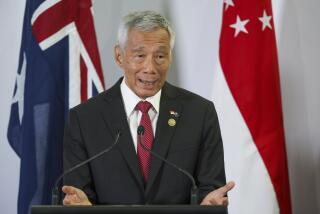At Delicate Time for Hong Kong, Finance Chief Gets No. 2 Post
- Share via
HONG KONG — Financial Secretary Donald Tsang was handed the No. 2 job in Hong Kong’s government Thursday in the first major leadership reshuffle since the territory was handed back to China 3 1/2 years ago.
Tsang’s appointment to the post of chief secretary follows last month’s sudden announcement that Anson Chan--an outspoken defender of democratic values--planned to retire well before her term was to expire.
Antony Leung, 49, the head of J.P. Morgan Chase & Co.’s Asia-Pacific operations, was picked to succeed Tsang as financial secretary, a post viewed as the third-most powerful in the government. Both appointments required confirmation by Beijing.
Tsang, 55, a respected career civil servant, takes over the territory’s chief administrative position at a crucial time for the fragile political experiment that has allowed Hong Kong to exist as a largely democratic region, but one under Chinese sovereignty--an experiment known as “one country, two systems.”
Chan’s departure in January came amid reports that she had run afoul of Beijing’s Communist leaders, who apparently believed that she had failed to support Tung Chee-hwa, Hong Kong’s chief executive, with enough enthusiasm.
In the weeks since Chan decided to quit, the shadow of Beijing has grown more visible in the territory. As China has pursued its campaign against the banned Falun Gong spiritual movement on the mainland, some political leaders have called for a closer watch on the movement’s activities in Hong Kong. Falun Gong is legal in Hong Kong and last month held a convention here that went off peacefully.
Tung gave the cold shoulder to China’s first Nobel laureate for literature, Gao Xingjian, during the writer’s recent visit to the territory. Gao has lived in exile in Paris for more than a decade, and his writings--many of which challenge the Communist system--have been denounced by China’s leaders.
The departure of Chan, a leader sometimes described as Hong Kong’s conscience because of her high ethical standards and no-nonsense manner, is also seen as a precursor to possible restrictions on the considerable autonomy the region enjoys.
Although Tsang established himself as a skilled, albeit sometimes controversial, technocrat during his nearly six years in charge of Hong Kong’s finances, his ability to fill Chan’s role as an articulate defender of democratic values is largely unproven. Pro-democracy groups view that role as important because of Tung’s often equivocal statements on the issue.
“Too early to tell,” said Paul Harris, chairman of the independent Hong Kong Human Rights Monitor. “There have been indications that he’s broadly sympathetic to democracy, but how people shape up on a job of this kind is unpredictable.”
At a news conference Thursday, Tsang tried to ease worries about his commitment to Hong Kong’s freedom.
“Hong Kong’s success has been built on a rule of law, a level playing field for business, the free and unfettered flow of news and information,” he said. “We have to show clearly to mainland China and the rest of the world that ‘one country, two systems’ has been working successfully in Hong Kong.”
Tsang, a diminutive, quick-witted figure whose bow tie has become his trademark, won kudos for guiding Hong Kong’s economy through the worst of the 1997-98 Asian financial crisis, but he became ensnared in controversy a year later when he used more than $10 billion of government money to prop up the local currency and equities market in a fight against speculators.
More to Read
Sign up for Essential California
The most important California stories and recommendations in your inbox every morning.
You may occasionally receive promotional content from the Los Angeles Times.













